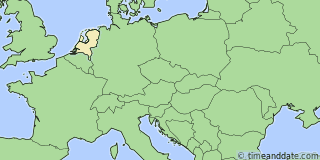Time Zones Currently Being Used in Netherlands
| Offset | Time Zone Abbreviation & Name | Example City | Current Time | |
|---|---|---|---|---|
| UTC -4 | AST | Atlantic Standard Time | Oranjestad | Wed, 1:40:48 am |
| UTC +1 | CET | Central European Time | Amsterdam | Wed, 6:40:48 am |
How Many Time Zones Are There in the Netherlands?
The Netherlands has two time zones. The country's European mainland, including the capital Amsterdam, observes Central European Time (CET) as standard time. When Daylight Saving Time (DST) is in force, Central European Summer Time (CEST) is observed.
The country's dependencies, island territories in the Caribbean Sea, all lie in the same time zone: Atlantic Standard Time (AST), which is 4 hours behind Coordinated Universal Time (UTC). Please see below for a list of the Netherlands' dependencies.
Time Zone Not Currently Being Observed in Netherlands
| Offset | Time Zone Abbreviation & Name | Commences | |
|---|---|---|---|
| UTC +2 | CEST | Central European Summer Time | Mar 30, 2025 |
The above time zone is used during other parts of the year. It will become active again after the next clock change as Daylight Saving Time begins or ends.
Time Zones Being Used in Dependencies of Netherlands
| Offset | Time Zone Abbreviation & Name | Dependency | Type | Current Time | |
|---|---|---|---|---|---|
| UTC -4 | AST | Atlantic Standard Time | Aruba | Constituent country | Wed, 1:40:48 am |
| AST | Atlantic Standard Time | Caribbean Netherlands | Constituent country | Wed, 1:40:48 am | |
| AST | Atlantic Standard Time | Curaçao | Constituent country | Wed, 1:40:48 am | |
| AST | Atlantic Standard Time | Sint Maarten | Constituent country | Wed, 1:40:48 am | |
Time Zone History of the Netherlands
The Netherlands standardized its civil time in 1909. Until then, each location in the country had observed its own solar time. In 1909, all clocks in the Netherlands were synchronized with solar time in Amsterdam. Amsterdam Time or Dutch Time, as it was commonly called, was 19 minutes and 32 seconds ahead of Greenwich Mean Time (GMT), which was then the world's time standard. In 1937, the country's standard time was adjusted by 28 seconds to GMT+0:20 for simplicity's sake.
In 1940, German forces occupying the Netherlands during World War II advanced the country's local time by 1 hour and 40 minutes, effectively changing its time zone to Central European Summer Time (CEST), Germany's Daylight Saving Time (DST). The Netherlands remained on year-round DST until 1942. From 1942 to 1945, Dutch clocks followed Germany's schedule of DST switches.
In 1945, after the end of World War II, the country abandoned DST for over 3 decades. However, the time zone imposed by the German occupiers remains the country's standard time to the present day.

Time Zone News
- 9/27/2024 – Europe Ends DST 2024
- 2/28/2024 – DST Start in Europe 2024
- 10/2/2023 – End of DST in Europe 2023
- 3/24/2023 – DST Start in Europe 2023
- 9/30/2022 – End of DST in Europe 2022
More Information
- Time Zone Converter
- Meeting Planner
- Event Time Announcer/Fixed Time
- Time Zone Abbreviations
- Time Zone News
- Daylight Saving Time
Time Zone Map

